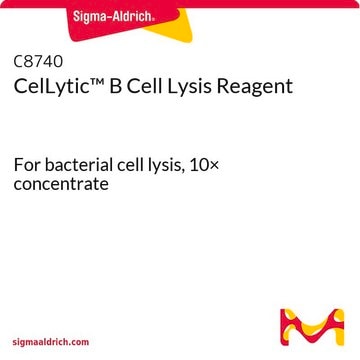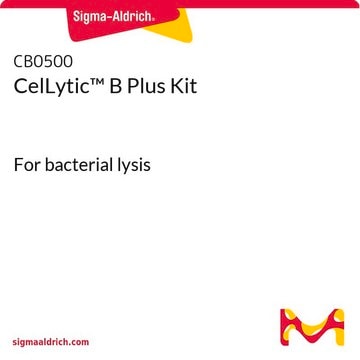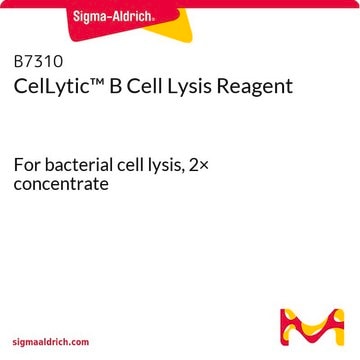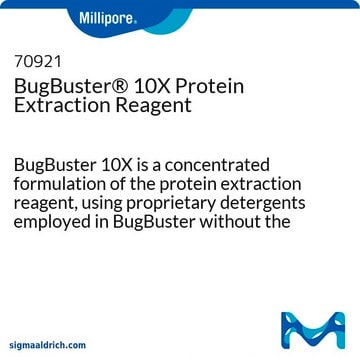CB0050
CelLytic™ B Plus Kit
For bacterial lysis
Synonym(s):
Cell Lysis Kit, Lysis Reagent
Sign Into View Organizational & Contract Pricing
All Photos(1)
About This Item
Recommended Products
Quality Level
usage
kit sufficient for 5 g fresh or frozen cell paste lysis.
technique(s)
protein extraction: suitable
shipped in
wet ice
storage temp.
−20°C
Looking for similar products? Visit Product Comparison Guide
General description
The CelLytic™ B Plus Kit is designed to efficiently lyse cells and extract proteins from both Gram negative, and difficult to lyse, Gram positive bacteria. This is accomplished using the standard CelLytic B, a proprietary non-ionic detergent in concert with lysozyme, Benzonase®, and protease inhibitors. This complete kit takes the guesswork out of protein extraction from a variety of bacterial species.
Application
This kit is compatible with FLAG®, HIS-Select®, and glutathione S-transferase based affinity chromatography protein purification systems. The detergent included in the CelLytic B Lysis Reagent can be removed from the protein by dialysis or ammonium sulfate precipitation, if necessary. The final purity of the recombinant product is usually higher than that obtained from traditional extraction methods. This is because the crude protein solution containing the non-ionic detergent eliminates much of the non-specific binding that occurs during chromatography. The mild detergent does not interfere with many enzyme assays or protein assays.
Features and Benefits
- Lyse Gram positive and Gram negative bacteria
- More efficient than sonication
- Compatible with affinity purification
- Isolate inclusion bodies for subsequent solubilization
- Non-denaturing cell lysis preserves protein function
Other Notes
The CelLytic™ B Plus Kit contains all of the reagents and chemicals necessary to lyse both Gram-negative and Gram-positive bacteria. This kit also includes protease inhibitors to help prevent the proteolytic breakdown of proteins.
Legal Information
Benzonase® Nuclease is manufactured by Merck KGgA, Darmstadt, Germany and its affiliates. Nycomed Pharma A/S (Denmark) claims worldwide patent rights to Benzonase Nuclease, which are licensed exclusively to Merck KGaA, Darmstadt, Germany.
Covered by US Patent No 7,282,475 B2 and are sold for research use only. Commercial use requires addtional licenses.
Benzonase is a registered trademark of Merck KGaA, Darmstadt, Germany
CelLytic is a trademark of Sigma-Aldrich Co. LLC
FLAG is a registered trademark of Merck KGaA, Darmstadt, Germany
HIS-Select is a registered trademark of Merck KGaA, Darmstadt, Germany
Kit Components Also Available Separately
Product No.
Description
SDS
- B7435CelLytic™ B Cell Lysis Reagent, For bacterial cell lysis, standard strengthSDS
- E1014Benzonase® Nuclease, ≥250 units/μL, ≥90% (SDS-PAGE), recombinant, expressed in E. coli, buffered aqueous glycerol solutionSDS
- P8849Protease Inhibitor Cocktail, for use in purification of Histidine-tagged proteins, DMSO solutionSDS
- L3790Lysozyme from chicken egg white, 10 mg/mLSDS
Signal Word
Danger
Hazard Statements
Precautionary Statements
Hazard Classifications
Eye Irrit. 2 - Resp. Sens. 1 - Skin Irrit. 2
Storage Class Code
10 - Combustible liquids
Flash Point(F)
Not applicable
Flash Point(C)
Not applicable
Certificates of Analysis (COA)
Search for Certificates of Analysis (COA) by entering the products Lot/Batch Number. Lot and Batch Numbers can be found on a product’s label following the words ‘Lot’ or ‘Batch’.
Already Own This Product?
Find documentation for the products that you have recently purchased in the Document Library.
Customers Also Viewed
Marc Nahmani et al.
Proceedings of the National Academy of Sciences of the United States of America, 114(15), 3832-3836 (2017-03-30)
Superresolution microscopy has fundamentally altered our ability to resolve subcellular proteins, but improving on these techniques to study dense structures composed of single-molecule-sized elements has been a challenge. One possible approach to enhance superresolution precision is to use cryogenic fluorescent
Hua Weng et al.
PloS one, 7(3), e32925-e32925 (2012-03-08)
Diminishing global fresh water availability has focused research to elucidate mechanisms of water use in poplar, an economically important species. A GT-2 family trihelix transcription factor that is a determinant of water use efficiency (WUE), PtaGTL1 (GT-2 like 1), was
Our team of scientists has experience in all areas of research including Life Science, Material Science, Chemical Synthesis, Chromatography, Analytical and many others.
Contact Technical Service













